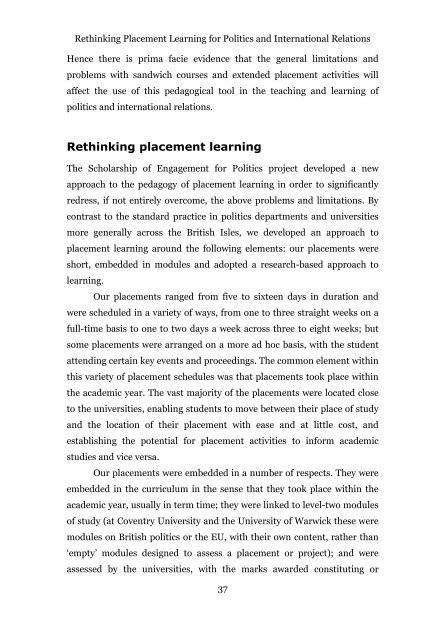The Scholarship of Engagement for Politics: - Higher Education ...
The Scholarship of Engagement for Politics: - Higher Education ...
The Scholarship of Engagement for Politics: - Higher Education ...
Create successful ePaper yourself
Turn your PDF publications into a flip-book with our unique Google optimized e-Paper software.
Rethinking Placement Learning <strong>for</strong> <strong>Politics</strong> and International Relations<br />
Hence there is prima facie evidence that the general limitations and<br />
problems with sandwich courses and extended placement activities will<br />
affect the use <strong>of</strong> this pedagogical tool in the teaching and learning <strong>of</strong><br />
politics and international relations.<br />
Rethinking placement learning<br />
<strong>The</strong> <strong>Scholarship</strong> <strong>of</strong> <strong>Engagement</strong> <strong>for</strong> <strong>Politics</strong> project developed a new<br />
approach to the pedagogy <strong>of</strong> placement learning in order to significantly<br />
redress, if not entirely overcome, the above problems and limitations. By<br />
contrast to the standard practice in politics departments and universities<br />
more generally across the British Isles, we developed an approach to<br />
placement learning around the following elements: our placements were<br />
short, embedded in modules and adopted a research-based approach to<br />
learning.<br />
Our placements ranged from five to sixteen days in duration and<br />
were scheduled in a variety <strong>of</strong> ways, from one to three straight weeks on a<br />
full-time basis to one to two days a week across three to eight weeks; but<br />
some placements were arranged on a more ad hoc basis, with the student<br />
attending certain key events and proceedings. <strong>The</strong> common element within<br />
this variety <strong>of</strong> placement schedules was that placements took place within<br />
the academic year. <strong>The</strong> vast majority <strong>of</strong> the placements were located close<br />
to the universities, enabling students to move between their place <strong>of</strong> study<br />
and the location <strong>of</strong> their placement with ease and at little cost, and<br />
establishing the potential <strong>for</strong> placement activities to in<strong>for</strong>m academic<br />
studies and vice versa.<br />
Our placements were embedded in a number <strong>of</strong> respects. <strong>The</strong>y were<br />
embedded in the curriculum in the sense that they took place within the<br />
academic year, usually in term time; they were linked to level-two modules<br />
<strong>of</strong> study (at Coventry University and the University <strong>of</strong> Warwick these were<br />
modules on British politics or the EU, with their own content, rather than<br />
‘empty’ modules designed to assess a placement or project); and were<br />
assessed by the universities, with the marks awarded constituting or<br />
37
















